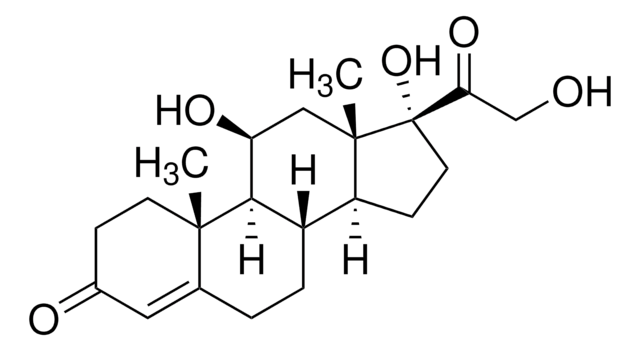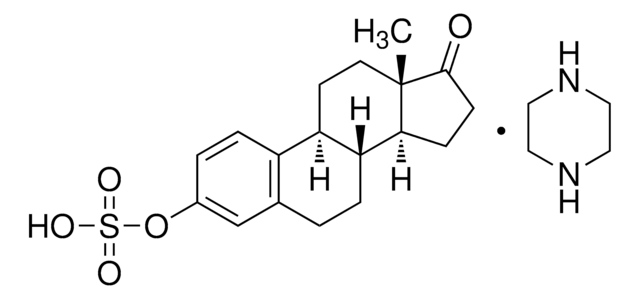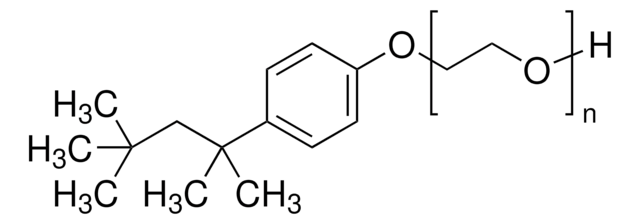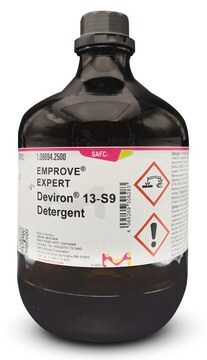F6432
FLT3 (571-993), active, GST tagged human
PRECISIO® Kinase, recombinant, expressed in baculovirus infected Sf9 cells, ≥70% (SDS-PAGE), buffered aqueous glycerol solution
Synonym(s):
CD135, FLK2, STK1
Sign Into View Organizational & Contract Pricing
Select a Size
All Photos(1)
Select a Size
Change View
About This Item
UNSPSC Code:
51111800
NACRES:
NA.32
Recommended Products
General description
FLT3 (fms-related tyrosine kinase 3) is a tyrosine kinase receptor and the gene is localized to human chromosome 13q12. The encoded protein is composed of 993 amino acids, and consists of five immunoglobulin (Ig)-like domains in its exoplasmic region. It is also composed of a transmembrane region, a juxtamembrane domain, and two tyrosine kinase domains in its intracellular domain. The tyrosine kinase domains are linked via a kinase-insert domain.
Biochem/physiol Actions
FLT3 (fms-related tyrosine kinase 3), upon interaction with its ligand, undergoes conformational changes to form homodimers. This results in phosphorylation and activation of downstream signaling pathways including phosphatidylinositol 3-kinase (PI3K/AKT), mitogen-activated protein kinase/extracellular signal-regulated kinase (MAPK/ERK) and signal transducer and activator of transcription 5 (STAT5) pathways. Internal tandem duplication (ITD) mutation or a point mutation in juxtamembrane domain-coding region or within the activation loop domain, respectively, of this gene lead to its constitutive action. FLT3/ITD mutation is associated with later stages of acute myeloid leukemia (AML) pathogenesis. These patients have poor prognosis.
Physical form
Supplied in 50 mM Tris-HCl, pH 7.5, with 150 mM NaCl, 0.25 mM DTT, 0.1 mM EGTA, 0.1 mM EDTA, 0.1 mM PMSF, and 25% glycerol.
Legal Information
PRECISIO is a registered trademark of Merck KGaA, Darmstadt, Germany
Signal Word
Warning
Hazard Statements
Precautionary Statements
Hazard Classifications
Aquatic Chronic 3 - Eye Irrit. 2 - Skin Sens. 1
Storage Class Code
10 - Combustible liquids
WGK
WGK 2
Flash Point(F)
Not applicable
Flash Point(C)
Not applicable
Choose from one of the most recent versions:
Certificates of Analysis (COA)
Lot/Batch Number
Don't see the Right Version?
If you require a particular version, you can look up a specific certificate by the Lot or Batch number.
Already Own This Product?
Find documentation for the products that you have recently purchased in the Document Library.
D Gary Gilliland et al.
Current opinion in hematology, 9(4), 274-281 (2002-06-04)
FLT3 is the most frequently mutated gene in cases of acute myelogenous leukemia (AML). About 30 to 35% of patients have either internal tandem duplications (ITDs) in the juxtamembrane domain or mutations in the activating loop of FLT3. FLT3 mutations
J L Christensen et al.
Proceedings of the National Academy of Sciences of the United States of America, 98(25), 14541-14546 (2001-11-29)
Clonogenic multipotent mouse hematopoietic stem cells (HSCs) and progenitor cells are contained within the c-kit(+) (K) lineage(-/lo) (L) Sca-1(+) (S) population of hematopoietic cells; long-term (LT) and short-term (ST) HSCs are Thy-1.1(lo). c-kit is a member of the receptor tyrosine
Alexa S Green et al.
Science advances, 1(8), e1500221-e1500221 (2015-11-26)
Fms-like tyrosine kinase 3 internal tandem duplication (FLT3-ITD) is frequently detected in acute myeloid leukemia (AML) patients and is associated with a dismal long-term prognosis. FLT3 tyrosine kinase inhibitors provide short-term disease control, but relapse invariably occurs within months. Pim
D L Stirewalt et al.
Blood cancer journal, 4, e208-e208 (2014-05-03)
Patients with high FLT3 internal tandem duplication allelic ratios (FLT3/ITD-ARs) have a poor prognosis. Single-nucleotide polymorphism/comparative genomic hybridization, single-cell PCR and colony-forming assays were used to evaluate genotypic evolution of high FLT3/ITD-ARs in 85 acute myeloid leukemia (AML) patients. Microarrays
Yesid Alvarado et al.
Cancer, 120(14), 2142-2149 (2014-04-17)
FLT3-internal tandem duplication (ITD) mutations are found in approximately 30% of patients with acute myeloid leukemia (AML). FLT3 inhibitors have shown clinical activity in AML with FLT3-ITD, but responses are usually short-lived. This study examined 69 FLT3-mutated patients with AML
Our team of scientists has experience in all areas of research including Life Science, Material Science, Chemical Synthesis, Chromatography, Analytical and many others.
Contact Technical Service







